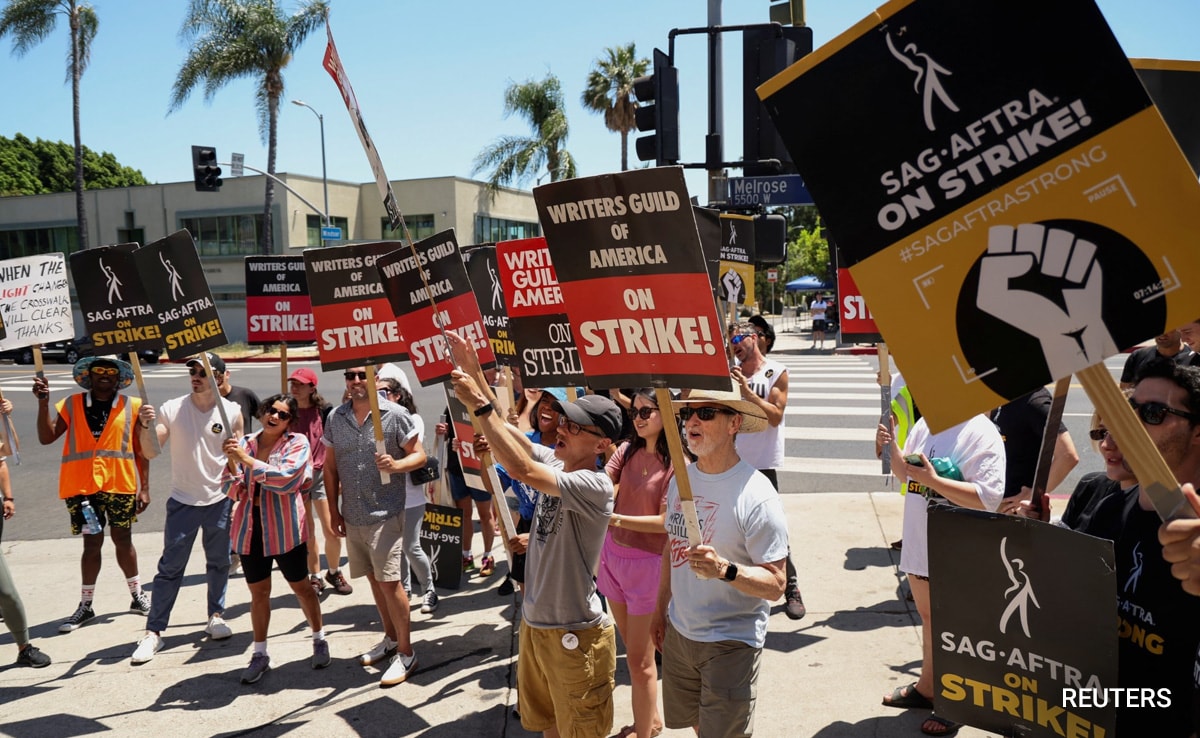Unprecedented Hollywood Strike: Actors And Writers Demand Change

Table of Contents
Key Demands of the Writers Guild of America (WGA)
The Writers Guild of America (WGA) strike is fueled by a multitude of concerns, primarily centered around fair compensation in the streaming era and the protection of writers' rights.
Fair Compensation in the Streaming Era
The shift from traditional licensing fees to streaming residuals has created a significant income disparity for writers. The old model of syndication and DVD sales provided a steady stream of income long after a show's initial run. Streaming, however, often offers minimal residuals, leaving many writers struggling to make ends meet.
- Specific demands regarding streaming revenue sharing: The WGA is demanding a more equitable share of streaming profits, reflecting the significant revenue generated by these platforms. They are pushing for transparency in how streaming revenue is calculated and distributed.
- Impact of AI on writing: The rise of artificial intelligence in writing poses a significant threat to writers' livelihoods. The WGA is concerned about the potential for AI to replace human writers and is demanding safeguards to protect their jobs and creative control.
- Writer income statistics: Recent reports show a drastic decline in median writer income, highlighting the urgent need for reform. The high cost of living in Hollywood further exacerbates the financial struggles faced by many writers.
Protecting Writers' Rights and Working Conditions
Beyond compensation, the WGA is also fighting for improved working conditions. The prevalence of "mini-rooms," where writers work long hours on smaller projects with minimal staff, has created an unsustainable workload for many.
- Excessive work hours: The WGA is demanding reasonable work hours and an end to the exploitation of writers through grueling schedules.
- Health benefits and pension plans: The union is seeking to improve and secure health benefits and pension plans for its members, ensuring financial security for writers throughout their careers.
- Creative control: Writers are demanding greater creative control over their work, preventing exploitation and ensuring their vision is respected.
SAG-AFTRA's Fight for Actors' Rights
The Screen Actors Guild - American Federation of Television and Radio Artists (SAG-AFTRA) joined the strike, echoing many of the WGA's concerns and adding their own specific demands.
Fair Compensation and Residuals for Streaming
Similar to writers, actors are also facing drastically reduced residuals in the streaming era. The traditional model of syndication and home video releases provided a significant source of income for actors, but streaming platforms often offer minimal or no residuals, impacting their long-term financial stability.
- Streaming revenue sharing for actors: SAG-AFTRA is demanding a more equitable share of streaming revenue, mirroring the WGA's call for transparency and fair compensation.
- AI-generated performances: The union is vehemently opposed to the use of AI to generate performances, arguing it threatens actors' livelihoods and devalues their creative contributions.
Protecting Actors Against AI and Self-Taping
The rise of AI and the increasing use of self-taping auditions are raising serious concerns for actors.
- AI replacing actors: SAG-AFTRA is fighting to prevent the replacement of actors with AI-generated performances, ensuring the protection of their jobs.
- Self-taping and safety: Self-taping auditions, while convenient, raise concerns about actors' safety and well-being. The union is demanding better safety regulations for auditions and on-set work.
The Impact of the Hollywood Strike
The Hollywood strike is having a significant impact, both economically and socially.
Economic Fallout
The strike's economic repercussions are far-reaching, affecting various sectors related to Hollywood productions.
- Job losses and revenue loss: The prolonged strike is leading to substantial job losses in related industries, including catering, transportation, and local businesses. Production companies are also experiencing significant revenue losses.
- Ripple effect on local economies: The economic impact extends beyond Hollywood studios, affecting local economies that rely heavily on film and television production.
Public Support and Media Coverage
The strike has garnered significant public support and media attention.
- Public opinion and media portrayal: The public largely sympathizes with the strikers' demands for fair compensation and improved working conditions. Media coverage has largely been supportive, highlighting the issues at stake.
- Social media and public awareness: Social media has played a crucial role in raising public awareness and mobilizing support for the strike.
Potential Outcomes and Long-Term Implications
The outcome of the Hollywood strike remains uncertain, but it will undoubtedly shape the future of the entertainment industry.
Negotiation Strategies and Possible Resolutions
Both unions are employing various negotiation strategies, including public pressure and solidarity actions.
- Potential outcomes: Possible outcomes range from significant concessions by the studios to a prolonged stalemate, highlighting the complex nature of the negotiations.
Shaping the Future of the Entertainment Industry
The Hollywood strike is forcing a crucial conversation about the future of the entertainment industry.
- Long-lasting changes: The strike has the potential to bring about long-lasting changes in compensation, working conditions, and the use of AI in the industry.
- Influence on future labor negotiations: The outcome of this strike will undoubtedly influence future labor negotiations in the entertainment industry, setting precedents for fair labor practices in the digital age.
Conclusion:
The unprecedented Hollywood strike is more than just a labor dispute; it's a fight for the future of the entertainment industry. Both the WGA and SAG-AFTRA are demanding fair compensation, improved working conditions, and protection against the encroaching influence of AI. The outcome of this Hollywood strike will significantly impact not only the actors and writers but also the entire entertainment landscape. Stay informed about the ongoing negotiations and support the workers who are fighting for a fairer, more equitable future in the entertainment industry. Understanding the complexities of this Hollywood strike is crucial for anyone involved in or interested in the future of filmmaking and television.

Featured Posts
-
 Portugal Derrota A Belgica 1 0 Resumen Goles Y Cronica Del Encuentro
May 16, 2025
Portugal Derrota A Belgica 1 0 Resumen Goles Y Cronica Del Encuentro
May 16, 2025 -
 Penarol Vs Olimpia Goles Resumen Y Analisis Del Partido 0 2
May 16, 2025
Penarol Vs Olimpia Goles Resumen Y Analisis Del Partido 0 2
May 16, 2025 -
 Jiskefet Ontvangt Ere Zilveren Nipkowschijf Een Verdiende Eer
May 16, 2025
Jiskefet Ontvangt Ere Zilveren Nipkowschijf Een Verdiende Eer
May 16, 2025 -
 What If Kd Went To Boston Analyzing A Potential Nba Trade
May 16, 2025
What If Kd Went To Boston Analyzing A Potential Nba Trade
May 16, 2025 -
 Ukraina Pod Massirovannym Udarom Rossiya Vypustila Bolee 200 Raket I Dronov
May 16, 2025
Ukraina Pod Massirovannym Udarom Rossiya Vypustila Bolee 200 Raket I Dronov
May 16, 2025
